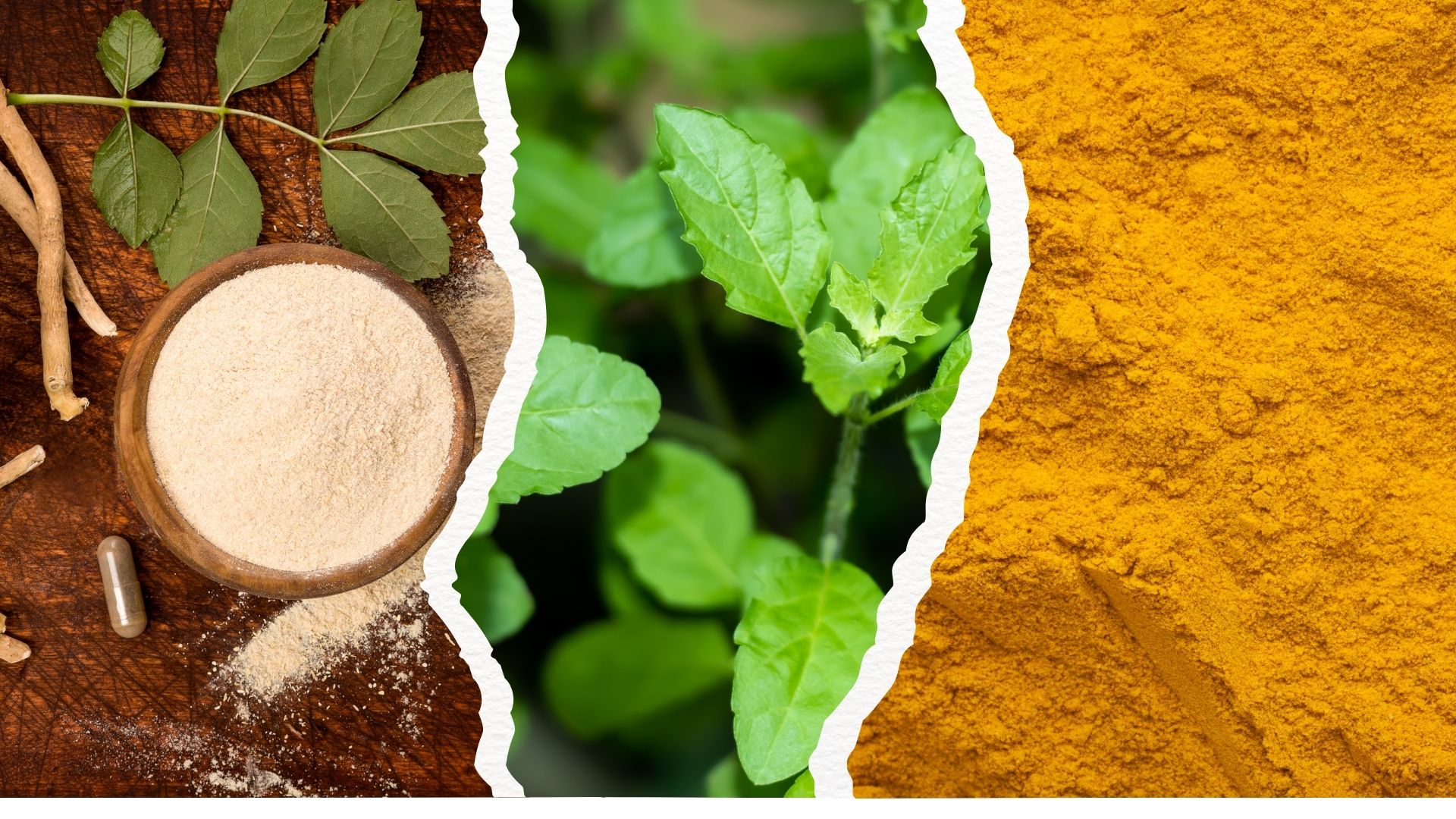
India’s ancient medical system, Ayurveda, has relied on herbs for thousands of years to heal the body naturally. In fact, many modern medicines have roots in these ancient remedies. Today, as more people turn toward natural and holistic health solutions, three powerful Indian herbs—Ashwagandha, Tulsi (Holy Basil), and Turmeric—stand out for their wide range of benefits. These herbs are so versatile that they could replace half the bottles in your medicine cabinet. Let’s explore how.
Table of Contents
Ashwagandha – The Natural Stress Reliever
Ashwagandha, also known as Withania somnifera or Indian ginseng, is one of Ayurveda’s most celebrated herbs.
Key Benefits:
-
Reduces Stress and Anxiety: Ashwagandha lowers cortisol levels (the stress hormone), helping the body cope with daily pressure.
-
Boosts Energy & Stamina: It enhances physical strength, making it popular among athletes.
-
Supports Mental Health: Improves focus, memory, and overall brain function.
-
Balances Hormones: Known to support thyroid and reproductive health.
-
Improves Sleep Quality: Helps with insomnia by calming the nervous system.
How to Use:
Ashwagandha is commonly available in powder, capsules, or liquid extract. You can take it with warm milk before bedtime for better sleep and relaxation.
Tulsi (Holy Basil) – The Queen of Herbs
Tulsi, or Holy Basil, holds a sacred place in Indian households, not only for its spiritual significance but also for its medicinal value.
Key Benefits:
-
Boosts Immunity: Rich in antioxidants and essential oils that strengthen the immune system.
-
Fights Infections: Natural antibacterial, antiviral, and antifungal properties.
-
Relieves Respiratory Issues: Helps with cough, cold, bronchitis, and asthma.
-
Manages Stress: Acts as a natural adaptogen, balancing the body’s stress response.
-
Supports Heart Health: Helps regulate blood pressure and cholesterol levels.
How to Use:
Drink Tulsi tea daily, chew fresh leaves, or use Tulsi drops in water. For respiratory relief, Tulsi with honey and ginger is a classic home remedy.
Turmeric – The Golden Healer
Turmeric, or Curcuma longa, is one of the most researched herbs worldwide, thanks to its active compound curcumin.
Key Benefits:
-
Powerful Anti-Inflammatory: Helps with arthritis, joint pain, and chronic inflammation.
-
Boosts Immunity: Strengthens the body’s defense system.
-
Supports Digestive Health: Relieves bloating, indigestion, and gut issues.
-
Promotes Skin Health: Fights acne, reduces scars, and brightens complexion.
-
May Prevent Chronic Diseases: Studies suggest turmeric supports heart health and may reduce the risk of diabetes and certain cancers.
How to Use:
Add turmeric powder to milk (golden milk), curries, or smoothies. For better absorption, combine it with black pepper (piperine boosts curcumin absorption).
Science-Backed Wisdom
Modern research supports what Ayurveda has taught for centuries: these herbs are packed with bioactive compounds that heal the body naturally. Studies show:
-
Ashwagandha reduces stress and improves sleep quality.
-
Tulsi enhances immunity and acts as an adaptogen.
-
Turmeric fights inflammation and supports long-term health.
Precautions
While these herbs are safe for most people, moderation is key.
-
Ashwagandha: Avoid during pregnancy and if you have thyroid issues without consulting a doctor.
-
Tulsi: May thin blood; avoid excess if you’re on anticoagulants.
-
Turmeric: High doses may upset the stomach or interfere with medications.
Always consult a healthcare provider before starting herbal supplements, especially if you’re on prescribed medicines.
Ashwagandha, Tulsi, and Turmeric are more than just herbs—they’re powerful natural remedies that can help manage stress, boost immunity, and reduce inflammation. By adding them to your daily routine, you may reduce your dependency on multiple chemical-based medicines while nurturing your health the natural way.
👉 Nature has already given us a medicine cabinet—sometimes, it’s just growing in our gardens or sitting on our spice racks.


